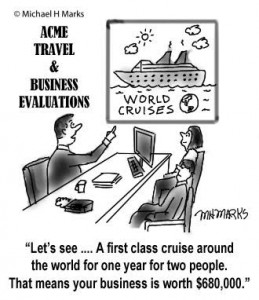Sometimes Less is more. Less time for work that is.
Today, work-day often is 24×7 affair, particularly if you are running your own small business. You are always checking your emails, answering emails from your prospects or customers. Although you may be seemingly enjoying your weekend or vacation, it is often hard to get away from work completely.
I used to be that way too. But lately, I have found that getting away from work completely, say for weekends or on short vacations, actually rejuvenates you and make you more productive. And you get just as much done in the allotted time, if not more. Remember the famous Parkinson’s Law: “Work Expands to fill the available time for its completion”?
This statement, first made in 1955 by British author Cyril Parkinson for an article for “The Economist” is one of the most profound observation. So when you reclaim your personal time to be spent with family, friends, and on non-work things, you end up compressing the time available to finish the work and you manage to do it!
This past memorial day was amazing. Our two sons were back from college and with us for a few days. The week before my older “twin” boy (older by 7 minutes), declared that on Memorial Day, we were going to clean up both, our garage and basement. Our detached garage (which is actually used as a workshop and storage area) had become a complete mess – it was impossible to make your way from the front to the back). Basement had also piles of paper and stuff – things that we collect. So we had a three day deadline to clean up the mess that we created over past 10-15 years. Actually we got a late start on Saturday, but by 3 pm we had over half the stuff in the garage separated out as trash to be thrown out. And we discovered how great the “1-800-Got-Junk” was. While we were creating a giant pile in the driveway for a trash hauler, I was pleasantly surprised that I could book a time for Got-Junk people to come an haul away all the junk the same day in the 3-5 pm window! So with 3 pm deadline looming (which was just about 3-4 hours since we started our clean-up), we had to finish separating out the trash in just a few hours. And true to Parkinson’s law, we managed to do it. On Sunday, while my sons put up some organizers and shelves in garage and organized the tools and other stuff in the garage, me and my wife tackled the basement and got it completely cleaned and organized by Monday evening. One long weekend, two seemingly endless tasks, done very well and within the available time. One more victory for the Parkinson’s law.
Yes, with Teamwork, focused energy, and a hard deadline, we are capable of doing amazing things. But we are after-all humans – we need to be reminded of this often.
Do you find yourself procrastinating on things that must be done? Or always falling behind in your tasks? And always stressing out because things are not getting done? Or working all the time?
We needlessly stress out on things on our “To-do” Lists, make complicated plans, give our tasks unnecessarily long time lines and then put them off till the last minute because we fear tackling them.
Next time, just try these few simple things:
- Enjoy your weekends and reclaim your personal time. Get unplugged from your laptop or cellphones and get plugged in to your family and friends and hobbies
- Remember Parkinson’s law – You do have time to finish your tasks and goals. Give focused effort, compress your time-frame to get things done, rally your team members, and simplify your tasks and goals
- And keep reminding yourself about Parkinson’s Law every time you try getting stressedI love Nike’s slogan – ‘Just do it’. Instead of endless planning, just plunge ahead and start tackling things you are putting off.



